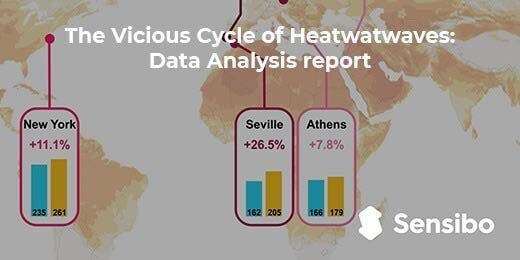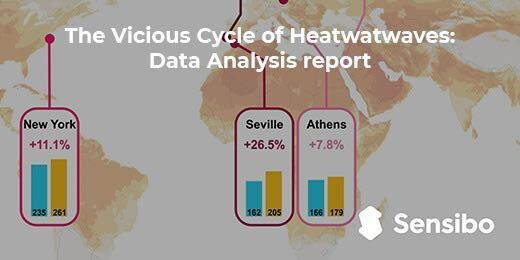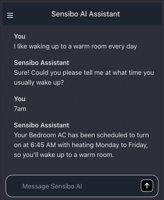The Surge in AC Usage and Heatwaves: A Call for Smart Solutions

Recent years have witnessed a dangerous increase in the frequency and intensity of heat waves worldwide, leaving people seeking refuge from the scorching temperatures. Europe, in particular, faced the wrath of extreme heat when record-breaking temperatures were recorded in various regions. Tragically, these heatwaves had devastating consequences, with researchers attributing over 61,000 deaths in Europe to the extreme heat of summer 2022, making it the hottest on record for the continent as published by Nature Medicine - At least until the readings from 2023 are analyzed later this year.
The heatwaves that struck Europe during the summer of 2023 were titled Cerberus, Charon, and Xenia, and they brought unprecedented temperatures that shattered previous records. Parts of Europe experienced scorching heat. Furthermore, the heatwaves in the west coast of the USA persisted into the summer of 2023, further intensifying concerns about extreme temperatures and their consequences.
As the global community grapples with the effects of these unprecedented heat events, Sensibo, the pioneer in smart climate control, has been at the forefront of understanding and addressing the surge in air conditioning (AC) usage during these extreme weather conditions. Sensibo's data analysis provides crucial insights into the trends of AC usage during the summer months of 2022 and 2023. Let's explore the significant findings from Sensibo's data analysis and understand the implications for our energy consumption and the environment.
Sensibo's Data Analysis: Unveiling the AC Surge
In response to the escalating heat and its consequences, Sensibo undertook a data analysis to understand the impact of heat waves on AC usage. Relying on data from 350,000 connected devices worldwide, Sensibo compared the AC usage between the summer of 2022 and the same period in 2023 (June 15 - July 15). The results were eye-opening:
- Lisbon experienced a staggering 41% increase in AC usage during the summer of 2023.
- Berlin witnessed a significant 28% rise in AC usage during the same period.
- Seville saw a substantial increase of 26.5% in AC usage compared to the previous year.
- Athens saw a 7.8% increase compared to the same period last year
- Tel Aviv measured a 4.1% increase in AC usage year over year.
Across the United States, the trend was similar:
- Seattle observed a 28% surge in AC usage.
- New York City recorded an 11% increase in AC usage.
- Portland, OR, witnessed a 9% rise in AC usage.
- Phoenix, Arizona recorded an 8.3% increase in AC usage

The Vicious cycle of AC usage
The Vicious cycle of AC usage perpetuates an ecological problematic loop; as people rely on their air conditioning, it engulfs significant energy, resulting in heightened carbon
emissions. These emissions, in turn, contribute to the escalating heat of the planet, compelling people to increasingly resort to their ACs, further amplifying the emissions, thus ensnaring humanity within a vicious cycle environmental loop.
The Urgency for Smart AC Solutions
As cooling and heating devices account for 25% of the world's energy consumption, the surge in AC usage during heat waves contributes significantly to greenhouse gas emissions. This vicious cycle of increased energy demand and rising temperatures further intensifies the need for smart AC solutions. For comparison, cars account for approximately 12% of total energy consumption
and airplanes account for a mere 7% of overall energy consumption. Those figures clarify the urgent need for faster adoption of Smart AC solutions, in order to optimize their energy consumption.
Sensibo's revolutionary technology empowers users to transform their existing AC units into intelligent devices. By leveraging AI and smart sensors, Sensibo devices are recommending suitable temperature settings, optimizing energy usage, and providing timely maintenance alerts, Sensibo can reduce AC energy consumption by an average of 20% without compromising home comfort. Such innovative solutions are essential to break free from the ecological loop of escalating emissions and heat waves. The findings from our data analysis serve as a compelling reminder that it is imperative for us to start cooling more responsibly.
Conclusion
The devastating heatwaves of recent years have left an indelible mark on the global community, reminding us of the urgent need to address climate change and its effects. Sensibo's data analysis sheds light on the surge in AC usage during these extreme weather events, calling for the adoption of smart AC solutions to reduce energy consumption and combat carbon emissions.
As we embrace innovative technologies and take conscious steps to mitigate the impacts of heat waves, we can collectively work towards creating a sustainable and cooler future for generations to come. Sensibo remains committed to developing smart climate control solutions that not only provide comfort but also contribute to preserving our environment and safeguarding our planet. Together, let's take action and make a positive difference in the face of climate challenges.








































